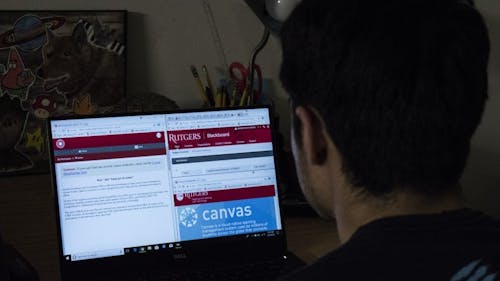Online classes help alleviate social anxiety among other perks for students

While most Rutgers students take a bus to class and sit in a lecture hall, others enroll in classes that take place miles away from campus.
Online courses present students who cannot take traditional classes an opportunity to earn their degree. They benefit students with strong writing skills, said Ian Dunham, a doctoral student in the School of Arts and Sciences.
“That’s 98 percent of the way I interact with students online,” he said.
Considering that all assignments are written submissions in his class, this is a crucial area to do well in, Dunham said. There is also less emphasis on class-like participation, since there is no face-to-face contact.
A positive to online classes is that they cater to the needs of those with social anxieties, issues with verbal fluency or anything else that might cause concern among students in a traditional classroom, he said.
“You may find that the student who would sit quietly in the back of a brick-and-mortar classroom is a significant contributor in an online course,” said Antonius Bittmann, associate vice president of online programs with the Center for Online and Hybrid Learning and Instructional Technologies.
There are some aspects of a traditional classroom that an online course cannot mimic, Bittmann said. In-person verbal exchanges, participation and public speaking in front of a crowd are just a few. Traditional classrooms are thought to be an easier outlet for professor critiques and having questions answered immediately.
Despite a popular misconception that online courses breed academic dishonesty, he said that cheating in an online course seems to be no more prevalent than cheating in a traditional classroom setting and that there are a series of steps professors take to discourage it.
“The multiple-choice exam could be set to be open-book and contain higher-level questions that evaluate higher-order thinking and analysis, or the exam might have an aggressive time limit whereby cheating would detract time from exam completion,” Bittmann said.
Precautionary measures on Rutgers websites like Sakai, eCollege and Canvas scan through assignment submissions to catch any plagiarism.
Online courses can also teach better organizational skills.
“I’ve definitely learned time management for sure,” said Beatrice Trinidad, a School of Arts and Sciences senior. She is currently taking three online classes and two hybrid classes.
Even with a vast experience in online courses, Trinidad said she still sees the importance of going to an actual classroom to learn and acknowledges that it is not for everyone.
“It’s not that I think every student should take (an online class), but I think it does benefit students in a way,” she said.



